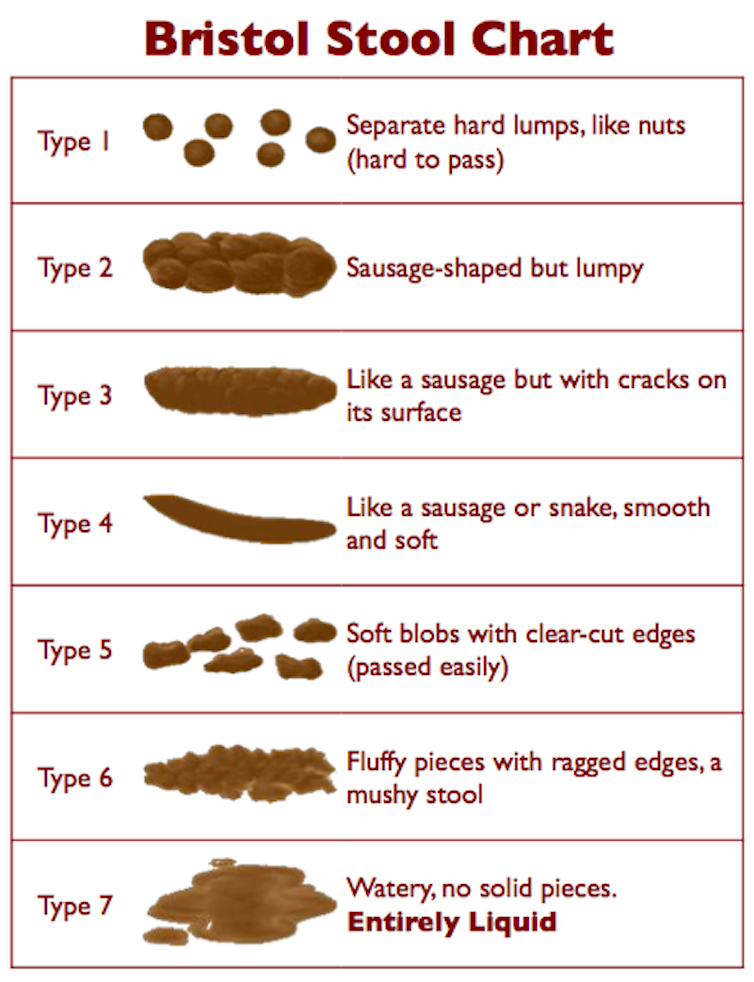When I was in my teens, I watched the comedy Crazy People, starring Dudley Moore and Daryl Hannah. Moore plays a burnt-out advertising executive who creates (hilarious) “honest” ads. One of the ads is for the fibre supplement Metamucil which claims:
It helps you go to the toilet. If you don’t use it, you’ll get cancer and die.
Perhaps this is a testament to the power of advertising, but this fake advertisement, inside a movie, had a long lasting effect on me. In fact, constipation is not associated with the development of bowel cancer. But I didn’t learn this until well into my medical studies!
What is constipation?
Constipation is the passing of hard, dry bowel motions (stools), which can cause straining and pain. Other common symptoms include passing stools less often, a sense of incomplete emptying after going to the toilet, and abdominal bloating and cramps.
The Bristol stool chart is used to classify faeces, and types one and two can indicate constipation.

From a medical perspective, the Rome Foundation publishes the diagnostic criteria for chronic constipation. I’m fond of this particularly apt mnemonic to remember:
Straining for at least 25% of the times
Hard stools at least 25% of the times
Incomplete evacuation sensation at least 25% of the times
Two times or less bowel movements a week.
Constipation is common. [Around](http://www.biomedcentral.com/1471-230X/8/5](http://www.biomedcentral.com/1471-230X/8/5) one in six to one in eight adults suffer from it, so most of us have probably experienced constipation at some stage in our lives.
Although there are many medical diseases that can lead to constipation, such as Parkinson’s disease, hypothyroidism, and hernias, these “organic” causes are by far the minority.
Most episodes of constipation are without structural underlying causes. More commonly, lifestyle and constitutional factors, often in combination, increase the risk of constipation:
- Dietary habits – particularly a change in diet, reduction in water intake, or a diet low in fibre

Physical inactivity – for instance, a reduction in regular exercise, or a sedentary lifestyle
Mood – anxiety and depression are associated with a number of gastrointestinal symptoms, including constipation
Drugs – many medications are known to increase the likelihood of constipation (such as opioid analgesics, antidepressants, iron supplements, some blood pressure medicines)
Age – older people are more likely to suffer from constipation, though mostly from the above factors.
So, how often should I go?
When my patients use the term “regular bowel movement”, they typically interpret it as meaning opening one’s bowels at approximately the same time, on a daily basis. Interestingly, only about one third of adults pass stools in such a pattern, making the conventional “normal bowel habit” not terribly “normal”!
There is considerable variation between individuals. The claim that stool frequency in well people ranges from three times a week, to three times a day, is quite old – it comes from a British study from 50 years ago. Nevertheless, it remains a relatively useful rule of thumb.
When should I be worried?
Simple constipation will generally resolve by addressing the aforementioned lifestyle factors. Your local community pharmacist will be able to give advice on the use of fibre supplements and over-the-counter laxatives if they are required.
Longer-term use of laxatives can be safe – but it depends on the medication and the clinical situation. This shouldn’t be a decision made without medical advice.
Although more serious causes of constipation are uncommon, they do occur. Should you experience any of the following, you should seek the advice of your regular general practitioner:
- having to use laxatives regularly to open bowels
- rectal bleeding
- mucous (slimy material) in the stool
- a change in bowel habit for no obvious reason
- alternating diarrhoea and constipation
- persistent pain with passing motions.
There is no pressing health need to aim for once-daily bowel motions for its own sake, if that isn’t “normal” for the individual. That being said, there are unambiguous health benefits from having sufficient fibre and water in the diet, and being physically active.
An obvious reason to manage constipation well, and aim to avoid it altogether, is – quite simply – that it’s unpleasant.

